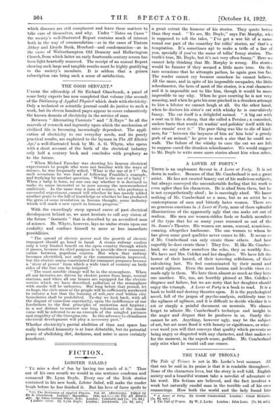THE GOOD SERVANT.* UNDER the editorship of Sir Richard Glazebrook,
a panel of some forty experts has now completed that volume (the second) of the Dictionary of Applied Physicsi which deals with electricity. Only a technical or scientific journal could do justice to such a work, but its eleven hundred pages appear to cover exhaustively the known domain of electricity in the service of man.
Between " Alternating Currents " and " X-Rays " lie all the marvels of research and ingenuity upon which the mechanism of civilized life is becoming increasingly dependent. The appli- cation of electricity to our everyday needs, and its purely practical results, are explained to the layman in The AU Electric Age,2 a well-illustratel book by Mr. A. G. Whyte, who opens with a short account of the birth of the electrical industry only half a century back and concludes with prophecy as to the future.
" When Michael Faraday was showing his famous electrical experiments to people who were not familiar with the ways of science, he was frequently asked, ' What is the use of it 1 ' On such occasions he was fond of following Franklin's example, and replying by another question, What is the use of a baby ? ' When a baby is born, no one can say whether it is destined to make its name immortal or to pass among the unremembered multitude. In the same way a man of science, who performs a successful experiment, cannot tell whether he has merely added another grain to the hill of kmowledge or whether he has produced the germ of some revolution in human thought, some industry which will mark a new epoch in human progress."
With the exceedingly steep upward curve of past electrical development behind us, we must hesitate to call any vision of the future " fantastic " that is described by an accredited man of science. Mr. Whyte, however, lays no undue strain upon our credulity and confines himself to more or less immediate possibilities.
" The spread of electric power and the growth of electric transport should go hand in hand. A steam railway confers only a very limited benefit on the open country through which it passes, because its chief purpose is to provide direct communi- cation between populous centres. But when that railway becomes electrified, not only is the communication improved, but the electric mains constructed for transport purposes become a river of power ' from which a wide tract of country on both sides of the line can be irrigated."
" The most notable change will be in the atmosphere. When all our factories are driven by electric power from large, central stations, and when all our houses are equipped for the electric service which we have described, pollution of the atmosphere with smoke will be unknown. But long before that period, let us hope, the civic sense of the people will be sufficiently awakened to enforce a law that the burning of soft,raw coal within city boundaries shall be prohibited. To-day we look back, with all the disgust of conscious superiority, upon the indifference of our forefathers to the first principles of sanitation and hygiene ; in a not distant to-morrow our long toleration of the smoke curse will be referred to as an example of the mingled patience and stupidity of the Georgian era. In this advance to cleanliness electrical development will play a necessary part."
Whether electricity's partial abolition of time and space has really benefited humanity is at least debatable, but its potential power of abolishing dirt, darkness, and noise is more certainly beneficent.


































 Previous page
Previous page